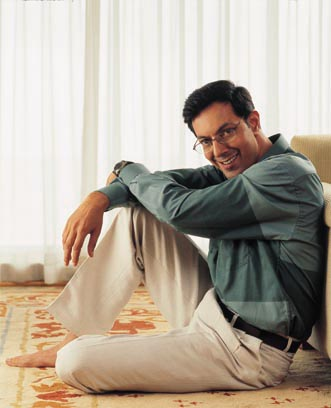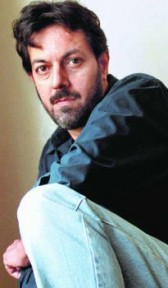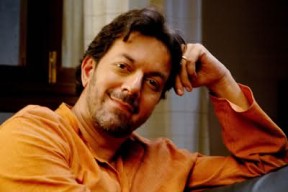There is a moment in Dil Chahta Hai when in a festive sangeet crackling with sudden hostility, Rajat Kapoor rises and stands next to Aamir Khan. His nervousness masked by the way he touches his nose fleetingly. But you know instantly whose side he is on and you remember that moment. Just as you remember the scene in Monsoon Wedding when a day after his paedophile Tej bhai saab has been unmasked, he enters the family room, graciously opening doors for guests, trying not to betray just what he is feeling, pretending that he is still the beloved family patriarch. And then that moment when he is made to leave. With a head heavy with unspoken shame, he takes off his turban and in a way, the last shred of his dignity and leaves.
Two moments contrasting in tenor but stamped with something unforgettable by a gentle, understated, elegant actor who makes every little nuance, every frown, every word, every silence count.
And that is because he was not given acting opportunities easily. Today he is not only getting the work he deserves but creating a certain sensibility in cinema that he resonates with as an actor, writer and director (Raghu Romeo, Mithya, Mixed Doubles). Yet there is no noise or drama about the manner in which he has won three National Awards for a 26 minute non-feature documentary, Tarana, then for his short, Hypnothesis, and for Raghu Romeo in the Best Feature Film section (Hindi).
Rajat was in Bangalore to perform Atul Kumar’s The Blue Mug and Unboxed Writers got him to share his journey and its many landmarks with our readers.
It is obvious that your idea of cinema is an out-of-the-box story told differently. Are you happy with the way things have gone for you so far? Is there a place, do you think in Hindi cinema now for unusual stories like yours, unusual actors and directors like you?
There were certain things I had promised myself when I graduated from the Film and Television Institute of India (FTII). We did not have any illusions. One knew how the film industry works, how star centric they are – that they make crappy films- that there is no space for the ‘other’ cinema, that the actors (stars) are not interested in working in anything that is not mainstream, that the audience wants just another dose of the same old thing.
All of this was given. One was prepared to not make films. Though I would have died trying. It is sheer fate that one has been allowed to make a few films. I guess we were lucky enough to be born in a time of transition. Something changed and multiplexes came in and suddenly our kind of films could be made, more importantly could be released. And we discovered that there was an audience for these films too- however miniscule. One also knew back in 1988, that you are choosing to make a certain kind of films – and since this is a conscious choice, one should not crib. Never crib, no regrets.
Of course, having said that, it has not been easy at all. Very frustrating, at times you are on the verge of depression- but something keeps you going. I made my first feature film Private Detective in 1995, seven years after FTII- and then we could not finish it because the money disappeared before post production. Finally the film was ready in 1998 and I tried my best to release it- nothing doing. Those were pre-multiplex days, when releasing a non-star film was an impossibility. And then there was a struggle to make my next film. I had scripts of Mithya and Raghu Romeo ready by 1999 but nobody was interested in financing them. I kept meeting producers for the next three years. No go. Luckily, my acting career started around that time- and for the first time in my life I had a little money- not much, but some. I started to save four lakhs a year. In three years, I had 12 and I said , “now I am going to produce Raghu Romeo.” NFDC came in as co-producers and I raised a loan of some 25 lakhs, and that is how Raghu Romeo got made in 2003.
It went to some 24 film festivals, got a National Award- but releasing the film was still a nightmare. It was released in July 2004 and bombed at the box office. It broke my heart, besides the fact that I had to now pay back 25 lakhs to the creditors (which took another four years). But what plunged me into a depression was the fact, that because of the failure of Raghu Romeo – I will not get to direct a film for the next five years.
That is when things changed slightly for the better. Someone who had seen Raghu Romeo (Sunil Doshi) said, ‘‘I have this much money. Do you think you can make a film in this much? I said yes! And we made Mixed Doubles almost immediately. And then Mithya and then in 2008 I directed A Rectangular Love Story. In fact 2008 was a year when we thought everything was possible- wrong again! Recession hit the industry and it seems the worst affected was the independent film. Everything stopped- money disappeared. The last film I made is still not released, and I have not been able to direct another film since then. Been writing with the belief that things will change again. They haven’t yet- but on the plus side, I have now four finished scripts.
Dil Chahta Hai, Monsoon Wedding and Bheja Fry have been roles that filmgoers not aware of your large body of work associate you with. What are your memories of these films?
Monsoon Wedding was my first film in fact. Dil Chahta Hai and Monsoon Wedding were shot the same year. Naseer had seen me on stage and he is the one who recommended my name to Mira. Mira was not sure that I should play Tej Puri till we began shooting. Putting on age was a concern. And the role was the concern for me- should I play it? Oh God, I died a thousand deaths before I said yes. The shoot itself was fab. Mira is a wonderfully warm person and that warmth spread to the whole unit. It was a picnic.
Dil Chahta Hai shoot was nothing spectacular for me- except that it was in Sydney. I had a small part in the film – so not many memories either. Bheja Fry was a ball. We had super fun shooting that film- at that time no one knew the film shot at a budget of 53 lakhs would become such a big success and people would remember it for so many years- and that Vinay Pathak will become a star. But all of it happened- and the chemistry was there for everyone to see.
Tell us a bit about your narrative in The Blue Mug and how you resonate with it?
You know in the rehearsals, we kept pouring out details of our lives, memories, some things we had not shared with anyone ever before. But of course this is not enough to make a play. We were also looking for a form that would contain all of this- and the idea was to use memories of important incidents (like my father’s death) along with the very mundane- because who you are is the sum total of all of
this.
Since the The Blue Mug is about personal memory, what are the things you are most nostalgic about?
I am nostalgic about my childhood- very much. I think maybe now a little less because in a way I am living it again through my children. I am also very nostalgic about places- places where one has spent time. It does something to me. I suppose that is normal- happens with everyone.
But having said that, I really live in the present. Like I say at the end of the play, ‘‘you know the thing is when I look back at my life- a year back, three months back- even three weeks back; I never see that guy as me- it is always him.. in the third person. Like I knew this guy, and these things happened to him- but it is not me.. because this is me- this, at this moment..” Well, something like that.
How would you describe Atul Kumar as a director and the rest of cast of The Blue Mug? Also Vinay Pathak and Ranvir Shorey have shared a fruitful creative journey with you..what is it about them that creates this wonderful synergy?
You know- it becomes a lot easier if you are working with friends. You share the same aesthetics, you share the same work ethics. So that does make life simpler. But beyond that, you trust each other- and so you can let go completely and I firmly believe that good atmosphere is the most conducive to making good work.
What are you working on/for in theatre and cinema next?
Well- in cinema – there is A Rectangular Love Story– that I have directed and will be released sometime! As an actor I have four or five films that are still waiting to be released ( I am 24, Iti Mrinalini, Pappu Can’t Dance Saala and 10 ML Love). Besides that, like I said I have four scripts ready and am working on my fifth one- and I hope to start shooting sometime soon- don’t know when, though. On the theatre front- my play Hamlet- The Clown Prince, which we made in 2008 is still running strong. We have done 110 shows of the play and it will run for another few years. That is something that makes me very happy. And then we might do a new play this year- or early next year..another clown play- with just one actor!
Reema Moudgil is the author of Perfect Eight (http://www.flipkart.com/b/books/perfect-eight-reema-moudgil-book-9380032870?affid=unboxedwri )









have always admired this actor and so enjoyed reading this. 🙂
These are the real people who are keeping this bollywood industry alive….hope the indian cinema goers see the actual talent rather than the runing around trees kinda movies and heroes …superbly written reema …i am a great admirer of mr rajat and of course your way of writting the unsaid things !